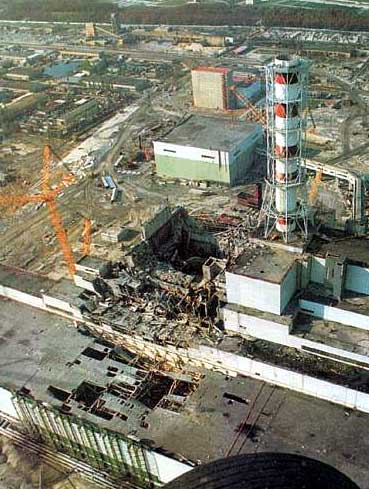
|
|
The Heroes Of Chernobyl
(April 24, 2006)

|
|

It was twenty years ago, on April 26, 1986, that Vasily Ignatenko and his wife were rudely awakened at 1:23 AM by the sound of an explosion. Their bedroom was lit by an eerie red glow. Flames were visible out their window, and since Vasily was one of the resident firemen at the Chernobyl Nuclear Power Plant, it was time to go to work. With a quick kiss he told his wife, "Go back to sleep. There’s a fire at the reactor. I’ll be back soon.”
Vasily and his fellow firemen battled the blaze for hours. In the words of his wife, "They went off just as they were, in their shirtsleeves. No one told them. They had been called for a fire, that was it." They didn't realize the cells of their bodies were being destroyed by radiation levels thousands of times above the lethal limit. None of them returned home to their wives and children. In a matter of hours their bodies were swollen and distorted. In a few days they were all dead.
A combination of design flaws and human error caused an explosion at the Chernobyl Nuclear Power Plant in Russia (now Ukraine) that was so powerful it blew off the 1,000 ton cover protecting reactor number four. The ensuing fire raged for 15 days, creating a cloud of radioactive smoke and debris that reached a kilometer into the sky. This cloud travelled the globe, spreading its poison. It reached North America on May 9. By that time the radiation levels were no longer toxic, but they were measurable, and significant.
The Chernobyl incident was the worst nuclear accident in history. Dozens died within days. Thousands were hospitalized with radiation sickness, and most of them died within weeks, or months. The long term effects will not be known for quite some time. What is known is that 9 tons of radioactive materials were released into the atmosphere, 90 times the radiation released by the bomb dropped on Hiroshima. Over 500,000 people were displaced by the accident, and over 2 million still live on contaminated land. The final costs, in terms of environmental damage and human suffering, will probably never be known.
But as bad as it was, it could have been a lot worse, if it hadn't been for the heroes of Chernobyl. Firemen who stopped the fire from spreading. Helicopter pilots who dropped sand and other materials onto the fire to help smother it and contain the radiation. Soldiers who were ordered into the worst of it to lend a hand. When some of the soldiers protested, they were told, “You’ll go to jail or be shot.” But most went willingly, knowing they were sacrificing themselves, and that the fate of countless thousands, or perhaps even millions, was hanging in the balance. There's no telling what the consequences might have been had the fires been allowed to burn any longer, or spread to the other reactors. To many, the firemen, pilots, soldiers, and others who sacrificed their lives at Chernobyl did nothing less than save the world.
For an extremely well written and moving account of one person's experiences inside the "dead zone" surrounding Chernobyl, please be sure and read Elena's story.
|
|
|